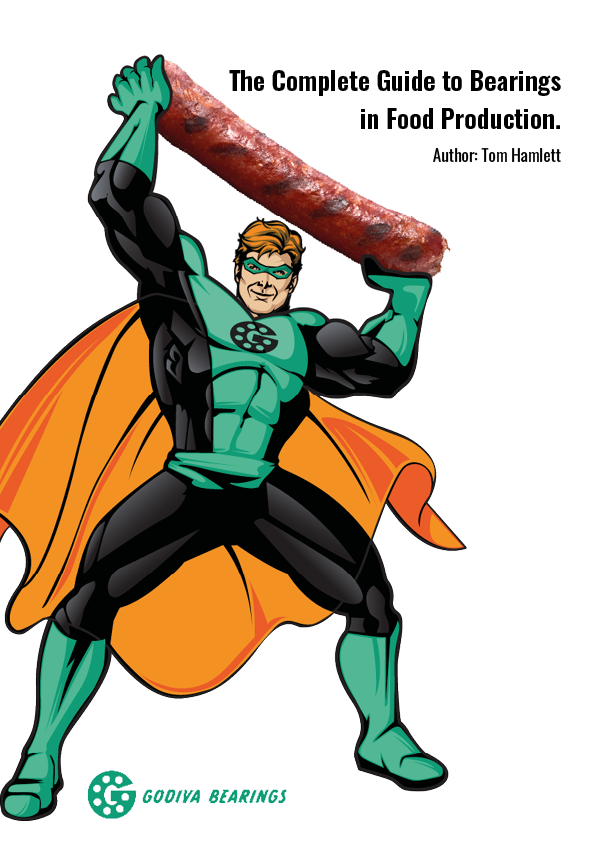Bearings in Food Production – The Complete Guide
Bearings in food production play a critical role in keeping lines moving smoothly and safely — from conveyors to capping units. You won’t see them on a site tour. But you’ll know about them the second they fail. They’re the quiet workhorses of food factories — and they’re everywhere.
From ovens and conveyors to slicers and mixers, food-grade bearings do the hard graft behind the scenes. And when they go wrong? It’s often costly, messy, and preventable.
This guide is designed for new trade desk staff and apprentices. Whether you’re speccing your first housing or trying to make sense of a hygiene audit, we’ll walk you through the fundamentals. No fluff. Just practical advice for keeping lines turning and customers happy.
Why Bearings Matter in Food Production
Bearings aren’t just components — they’re critical to every moving part on the factory floor:
- Conveyor belts
- Filling and capping lines
- Packaging equipment
- Ovens and cooling tunnels
- Rotary slicers and mixers
Each of these applications places different stresses on the bearing. Some operate at high speed. Others at high temperature. Some are hosed down hourly. Others sit inches from food product.
If they seize, the line stops. If they leak, you’ve got a contamination risk. And if they fail during a washdown? You’ve got hygiene issues and audit red flags.
Downtime from a single failed bearing can cost upwards of £3,000 an hour. That’s before reputational damage, failed audits, or wasted batches.
What Makes a Bearing Food-Safe?
Not all bearings are created equal. A standard bearing might survive on a forklift, but it has no place near a biscuit line or bottling unit.
Food-safe bearings are built to handle:
- Regular washdowns with caustic chemicals
- Exposure to fats, oils, water, and steam
- High and low temperatures
- Intensive hygiene audits
Key features include:
- Corrosion-resistant housings: Stainless steel (304 or 440) or polymer
- NSF H1 lubricants: Safe if they make incidental contact with food
- Sealed units: Multi-lip seals to block contaminants
- Ingress protection: IP66 or higher to handle pressure washing
- Audit-ready certification: NSF, FDA, EU 1935/2004
In short: if it’s not sealed, certified, and resistant — it’s not food-safe.
What Makes a Bearing Food-Safe?
Food-safe means more than shiny stainless steel. You need paperwork to match.
NSF International certifies lubricants and components as food-safe. Look for NSF H1 grease — safe for incidental contact.
EU Regulations 1935/2004 ensures materials won’t leach into food. Bearings must pass this to avoid contamination risk.
Got NSF or EU 1935/2004 certificates? Good. No certificates? Bad. Auditors will ask.
Trade tip: Always keep spec sheets on file. You don’t want to be guessing during an audit.
Explore our guide to food-safe bearings for more on compliance.
Common Applications and What to Watch For
Different parts of the plant need different bearing features. Here’s a quick guide:
Conveyor Systems
- Constant movement, often carrying open product
- Watch for: dust, water spray, grease leaks
- Try: Sealed units, stainless housings
Filling & Capping Lines
- Precision movement, close to open liquids
- Watch for: lubricant contamination, hard-to-clean zones
- Try: Auto-lube systems like Perma
Ovens & Cooling Tunnels
- Heat, expansion, rapid cycling
- Watch for: grease breakdown, housing deformation
- Try: High-temp bearings, heat-resistant grease, thermal barriers
Washdown Zones
- Hourly hosing, chemical foam, constant wet
- Watch for: corrosion, ingress, seal failure
- Try: Polymer housings, IP69K units, NSF sprays
Questions to Ask When Choosing
Before you send that quote, ask yourself — or your customer — the following:
- What’s the operating temperature range?
- Bearings in ovens or chillers need specialised lubrication and material resilience.
- Will this bearing be washed down daily?
- Daily cleaning with harsh chemicals can destroy standard seals and housings.
- Will it contact food, steam, or dust?
- Any exposure means NSF certification and high-grade sealing are essential.
- Are there hygiene or audit standards to meet?
- Factories may follow BRCGS, HACCP, or EU 1935/2004 compliance — get it in writing.
- Do we have documentation and certs for the product?
- Spec sheets, certs, and part traceability are all must-haves for audits.
Trade buyers often assume “sealed = safe.” But not all seals are equal. Make sure the unit is designed to handle the conditions it will face — not just the dimensions.
Lubrication – The Cause of Most Failures
You can have the perfect bearing — but the wrong grease will still ruin your day. Around 80% of food production bearing failures come down to lubrication issues.
Common causes:
- Incorrect lubricant (non-food-safe)
- Grease breaks down under heat
- Washdowns flush grease out
- Staff forget to re-grease during busy shifts
Look out for:
- Milky or leaking grease
- Rust stains below housings
- No sign of grease after cleaning
How to fix it:
- Always specify NSF H1 grease
- Re-lubricate after washdowns
- Switch to auto-lubrication units for consistency
- Keep lubrication logs — auditors will ask
Fitting and Maintenance – Small Errors, Big Problems
Installing food-safe bearings isn’t the same as fitting a standard insert. Here’s what new trade staff should know:
Fitting Tips
- Never hammer in a bearing
- Align the shaft perfectly — even 1° off wears seals unevenly
- Check housing and shaft for damage before installing
- Use sloped mounting plates to allow drainage
Maintenance Advice
- Listen for squeaks or knocking
- Check for uneven seal wear
- Keep cleaning sprays angled away from seals
- Replace units at first sign of breakdown — not after
Why Spec Matters More Than Price
It’s tempting to choose the cheaper bearing, especially when you’re under pressure to quote fast or hit a target price. But in food production, spec always wins over savings.
The risks of cutting corners:
- Downtime: A cheap, incorrectly spec’d bearing might work fine — until it meets a pressure washer. Then it fails. And the line stops.
- Contamination: If a non-food-safe unit leaks or flakes near product, you’ve got a hygiene incident — and possibly a full batch recall. To learn more about why Hygiene matters read our recent article on the subject.
- Audit failure: “Close enough” doesn’t pass an audit. If the component can’t be backed up with paperwork, it’s a liability.
The toughest loss of all? Trust.
Once a customer loses confidence in your supply, it’s hard to win back. You might get a second chance — but never a third. That moment when a plant manager says, “We had an issue with one of your bearings” — it sticks.
Trust is built through consistency. By delivering the right spec first time, you prove you understand their pressure, their standards, and their environment.
Real-world example:
“One of our distributors replaced a housing on a washdown line with a standard unit — same size, lower cost. Two weeks later, rust rings appeared. The customer flagged it on a hygiene inspection, and the trust was gone. They nearly lost the contract.”
So yes, food-grade units might cost more. But the cost of a failed bearing? Far higher.
Spec once, spec right. Use units designed for the job, and lean on suppliers who understand food environments.
Glossary for Apprentices (and the Rest of Us)
Bearing: Component that allows rotational or linear movement between parts
Sealed Unit: A bearing with integrated protection against dirt, water, and bacteria
NSF H1: Food-grade grease for incidental contact
IP Rating: Ingress protection – resistance to water/dust (IP69K is highest)
Composite Housing: A bearing housing made from plastic polymer – corrosion resistant
Perma: A brand of automatic lubrication systems
Conclusion: Bearings Might Be Small – But They Matter
Food factories are relentless. A minor failure at the wrong time can snowball into a major cost.
This is why spec matters. It’s why certifications matter. And it’s why you need a supplier that understands hygiene-critical environments.
Get more information about Food Grade Bearings – Trade-Only Support
Why Trade Desks Trust Godiva Bearings
Godiva stocks more than 65,000 product lines — including food-safe bearings for every zone of the plant. Our trusted brands include:
- LDK – Known for corrosion-resistant polymer and stainless housed units, designed for harsh washdowns.
- FAG/INA (Schaeffler Group) – High-performance stainless inserts and full housed units with excellent track records in hygiene zones.
- Perma – Market leader in automatic lubrication systems, cutting downtime and removing manual greasing errors.
- Ambersil – Widely used NSF-certified maintenance sprays that support safe cleaning during production.
- Beco Bearings – High-temperature bearing solutions ideal for ovens, tunnels, and other heat-intensive applications.
And we’re 100% trade-only. No webshop, no retail channel, no competing quotes.
Need help matching spec to application? Our team knows the questions to ask.

TOM HAMLETT
Tom Hamlett is a respected authority in the global bearings marketplace, with over 35 years of experience in industrial bearings, lubricants, and adhesives across a wide range of industries. As Managing Director of Godiva Bearings, Tom has built a trusted business renowned for its commitment to quality, technical expertise, and ethical service. Under his leadership, Godiva Bearings has remained the UK’s only trade-exclusive bearings supplier, proudly serving engineers and distributors worldwide since 1977. Tom’s in-depth knowledge and dedication have cemented his reputation as one of the most knowledgeable figures in the sector.

